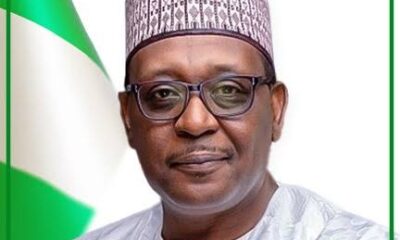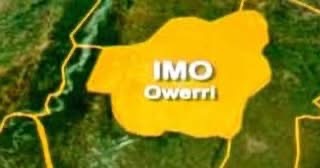Politics
Protests: Tinubu’s Real Troubles Are Just Beginning – Farooq Kperogi
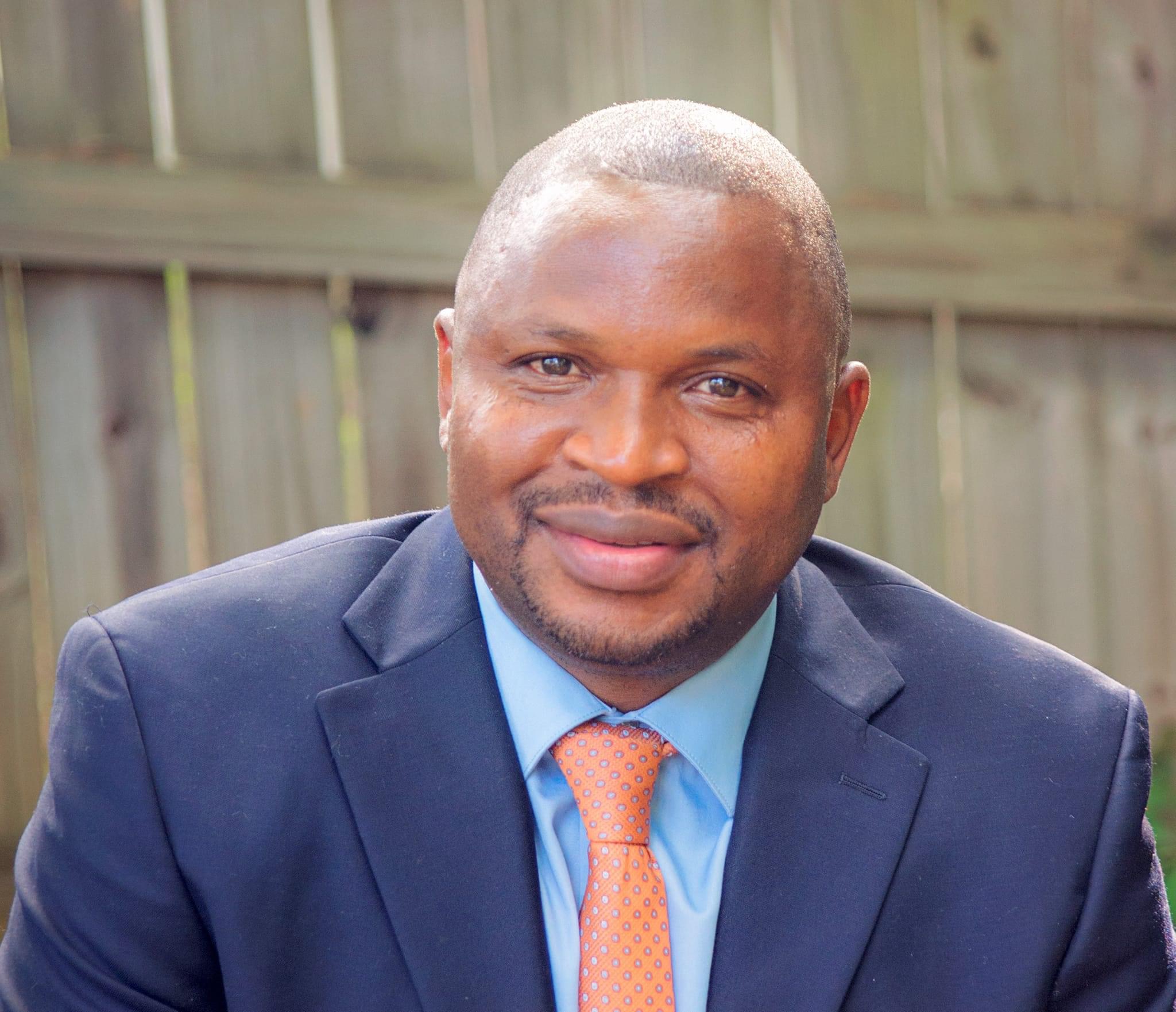
In light of his planned astronomical hike in petrol prices euphemistically called “subsidy removal” in 2023, which his opponents also promised to implement and caused Nigerians embrace as inevitable and desirable, I foretold the imminent social convulsion that is gathering momentum across Nigeria now.
“I can assure Tinubu that if petrol price hikes deepen people’s misery, he’ll have a tough time governing,” I wrote in my April 29, 2023, column. I followed this up with more than half a dozen columns on the same theme.
When you remove subsidies from an all-important product like petrol that literally regulates every facet of life in a country like Nigeria, which also has the dubious honor of being in perpetual competition with India for the status of the world’s poverty capital, and then follow it up with a massive devaluation of the national currency even when the country is hopelessly import-dependent, you unleash existential demons that compel vast swaths of people to choose between life and death.
False assurances that the mass agony in the country is only temporary, or that the pains people are grappling with are mere precursors to future gains, or even that there is light at the end of the tunnel only aggravate people’s angst. There are two reasons for this.
One, most people know that based on past experiences in Nigeria (notably during IBB’s ruinous SAP, which Tinubu merely repurposed and renamed) and elsewhere in the developing world where the IMF and the World Bank dictate economic policies, there has never been a single example of these sorts of pains ever transforming into gains for the masses of the people.
Second, people outside the circles of power and privilege realize that the pains are being borne only by the poor.
Tinubu, for example, bought a new presidential jet worth millions of dollars even before the spineless National Assembly had a chance to rubber-stamp it, as is now their wont, among other profligate expenditures amid a biting economic downturn.
People who are visiting darkness on the poor in the name of a deferred light at the end of the tunnel are glowing in incandescent bulbs of illumination. And the people are intelligent enough to know that what awaits them at the end of this disconsolate tunnel isn’t light. It’s an inferno. It’s a dreary snake pit of doom and gloom.
When people come to this realization, no one needs to “sponsor” them to protest. The pangs of hunger they feel is sufficient to sponsor them to protest. The sensation of hopelessness that overcomes them is a bigger motive force for protest than the political machinations of any politician.
But even if it’s true that opposition politicians are taking advantage of the mass discontent in the country to cripple the government and delegitimize it for their self-interest, that’s not illegal. It’s an intrinsic element of democracies for opposition parties to seize on the missteps of incumbents to displace them.
President Tinubu is in power today precisely because he mastered the art of instrumentalizing the missteps of incumbents to advance his political aspirations. As recently as 2012, he “sponsored” a disruptive protest against former President Goodluck Jonathan that led to the deaths of protesters—for precisely what he is doing to Nigerians now.
No amount of persuasion or financial inducement of traditional rulers, religious clerics, union leaders, or activists will get people to make peace with needless suffering occasioned by a self-centered, hard-hearted implementation of vicious economic policies that snuff the life out of the people. Even if the planned protests are aborted, the predictable is only being postponed.
The only way Tinubu can retain legitimacy and earn the trust of the people is to reverse the deep, stinging hurt his policies have caused to the vast majority of our people. People are no longer interested in progress or the renewal of hope. They just want Tinubu to take them back to where he met them, which was not an enviable state. And that’s not too much to ask.
In a February 10, 2024, column titled “Hunger Protests: Why Tinubu Can’t Govern Like Buhari,” I said the spontaneous, hunger-induced eruption of seething communal anger in Minna, Suleja, Kano, and Osogbo were “a warning sign” that Tinubu couldn’t afford to ignore. He ignored it.
He is probably following the Buhari template of enacting unpopular policies and relying on the blind support of his worshipers to shield him from the consequences of his actions. But Tinubu has no such following, and I am glad he doesn’t, which is why I would hate for someone like Peter Obi or Rabiu Kwankwaso to be president.
They are political cult leaders with unthinking, fanatical followers who lose their damned minds if you as much utter the mildest critical remark about their gods, however factual it may be. Like Buharists, they have abdicated their senses to their political gods.
I reproduce here a portion of the column to remind Tinubu why he can’t benefit from the kind of immunity Buhari enjoyed:
“Had the current president been Muhammadu Buhari and not Bola Ahmed Tinubu, chances are that the worst that would happen amid the adversity people are going through now would be suppressed, barely audible murmurs. It’s because Buhari is a political cult leader with a firm grip on his followers who worship him and surrender responsibility for their lives over to him. Tinubu has no such appeal.
“A psychologist by the name of Steve Taylor came up with a concept he called ‘abdication syndrome,’ which he said disposes people to invest total, child-like trust in a political figure, a cult leader, an opinion molder, etc. in ways that mimic how children idealize and idolize their parents as unblemished paragons of perfection.
“According to Taylor, ‘abdication syndrome stems from the unconscious desire of some people to return to a state of early childhood, when their parents were infallible, omnipotent figures who controlled their lives and protected them from the world. They’re trying to rekindle that childhood state of unconditional devotion and irresponsibility.’
“Buhari is lucky to benefit from abdication syndrome in Muslim northern Nigeria, broadly conceived, which explains why he got away with murder for eight years. When he increased petrol prices by a steep margin in 2016, for instance, there were protests in Kano, Bauchi, and other places in SUPPORT of the increase and AGAINST people who planned to protest the increase. Nigeria had never seen anything like that before.
“Even protests against the unabating descent of northern Nigeria into a theater of bloodshed and abduction on Buhari’s watch provoked counter protests from people who have abdicated the use of their brains in the service of Buhari.
“Tinubu not only does not have the benefit of abdication syndrome anywhere in Nigeria, but he also has the misfortune of having to contend with a peculiar character of Muslim northern Nigeria: we feel the pain of, and react violently to, bad policies only when the policies are hatched and executed by people who have no filiation with our natal region.
“It’s no surprise that the hunger protests against the Tinubu administration started from and spread in the North.
“A powerful indication of Tinubu’s lack of firm emotional support base emerged when Osun, his state of birth where he lost the last presidential election to PDP’s Atiku Abubakar, became the first southern state to join the hunger protests. Should the resistance to his punishingly heartless neoliberal economic policies ignite a nationwide convulsion, the Southwest is unlikely to constitute itself as his bulwark.
“In fact, I hazard a guess that should Tinubu’s unfeeling policies activate the sort of destabilizing national upheaval that we saw in 2012 during Goodluck Jonathan’s administration, the Southwest won’t be aloof. It is likely to join in.
“And, of course, Tinubu is deeply unpopular in the Southeast, the South-south, and Christian northern Nigeria. In other words, Tinubu is essentially floundering into the most treacherous of social quicksands.
“His only fortification against danger is not just good governance but compassionate governance. The release of thousands of metric tons of grains is a good first step, but it’s not nearly enough to stem the tide of mass rebellion that is brewing in the country. At best, it will only delay the inevitable.
“The truth is that Nigeria can’t survive a total withdrawal of petroleum subsidies without an adequate, systematic, well-planned public transportation system. To do away with petrol subsidies, the government must first create conditions where car ownership and patronage of commercial transportation are a luxury.”
Politics
Ndigbo are no longer spectators in the Nigerian project- Minister Dave Umahi dismisses calls for Biafra under Tinubu’s administration
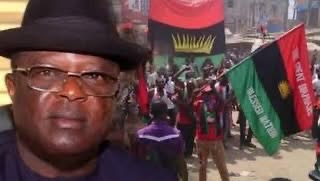
The Minister of Works, David Umahi, says the all-inclusive style of governance being practiced by President Bola Tinubu has made the agitation for Biafra an unnecessary clamour.
While speaking at the inspection of the Enugu-Anambra road last Saturday, December 13, Umahi said the Tinubu administration had given Ndigbo what they had sought for decades, not through secession, but through what he described as unprecedented inclusion in national governance and development.
He explained that the agitation for Biafra was historically driven by neglect, exclusion and underrepresentation at the federal level, but insisted that the situation had changed under the current administration.
“When a people are fully integrated, respected and empowered within the structure of the nation, the dream they once chased through agitation has already been achieved through cooperation.
The push for Biafran secession over the years was borne out of neglect, exclusion and underrepresentation but today the narrative has changed dramatically under President Bola Tinubu.
The President has deliberately opened the doors of national development to the South-East. Appointments, policy inputs and infrastructure priorities now reflect true federal balance.
Every sector now bears visible Igbo footprints. The emergence of Igbo sons and daughters in strategic positions is a testament to this inclusion.
Biafra was never about breaking Nigeria; it was about being counted in Nigeria. Through inclusion, equity and concrete development, Ndigbo are no longer spectators in the Nigerian project; they are co-authors of its future. When justice finds a people, agitation loses its voice.”he said
Politics
ADC Launches 90-Day Membership Drive, Fixes Dates For Congresses, National Convention
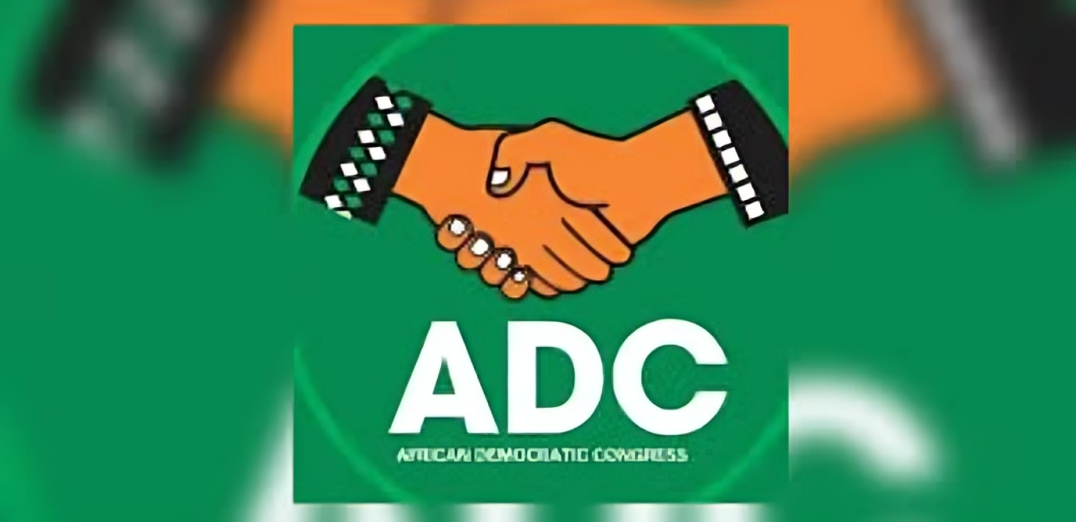
The African Democratic Congress (ADC) has announced a 90-day nationwide membership mobilisation, revalidation, and registration exercise as part of preparations for its internal party activities ahead of 2026.
The party also approved provisional dates for its congresses and the election of delegates at the polling unit, ward, and local government levels across the country.
In circulars issued by its national secretary, Rauf Aregbesola, the ADC said the congresses are expected to hold between January 20 and January 27, 2026.
The process, the party said, will lead to the emergence of delegates who will participate in its non-elective national convention scheduled for February 2026 in Abuja.
A statement by Bolaji Abdullahi, national publicity secretary of the party, said the decisions were reached at a meeting of the national working committee (NWC) held on November 27, 2025.
Abdullahi said the timetable and activities were approved in line with the resolutions of the NWC and in accordance with relevant provisions of the party’s constitution.
The ADC said further details on the membership exercise, congresses, and convention will be communicated to party members and stakeholders in due course.
Politics
INVESTIGATION: Why No Imo Governor Ever Controls Succession- The Untold Story
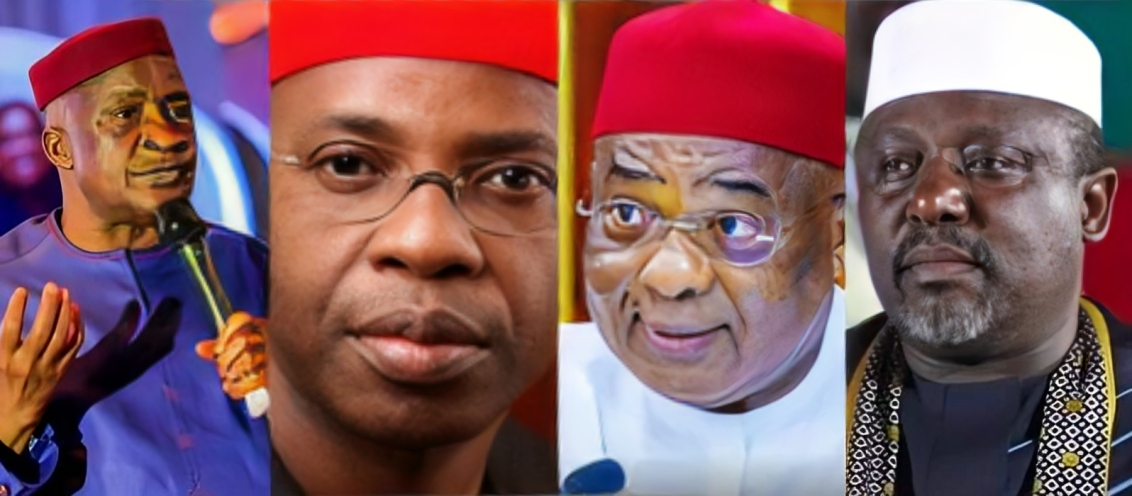
Imo State’s inability to sustain political succession from one elected governor to another is not accidental. It is the consequence of recurring structural failures rooted in elite conspiracy, federal power realignments, internal party implosions, zoning sensitivities, and the perennial arrogance of incumbency. From Achike Udenwa to Ikedi Ohakim and Rochas Okorocha, each administration fell victim to a combination of these forces, leaving behind a state where power is never inherited, only contested.
Achike Udenwa’s experience remains the most instructive example of how federal might and elite scheming can dismantle a governor’s succession plan. Governing between 1999 and 2007 under the PDP, Udenwa assumed that the party’s national dominance would guarantee internal cohesion in Imo. Instead, his tenure coincided with one of the most vicious intra-party wars the state has ever witnessed.
The Imo PDP split into two irreconcilable blocs. On one side was Udenwa’s grassroots-driven Onongono Group, powered by loyalists such as Alex Obi and anchored on local structures. On the other was a formidable Abuja faction populated by heavyweight figures including Kema Chikwe, Ifeanyi Araraume, Hope Uzodimma, Tony Ezenna, and others with direct access to federal influence. This was not a clash of personalities alone; it was a struggle over who controlled the levers of power beyond Owerri.
The conflict worsened when Udenwa openly aligned with then Vice President Atiku Abubakar during his bitter feud with President Olusegun Obasanjo. That alignment proved politically fatal. Obasanjo, determined to weaken Atiku’s network nationwide, withdrew federal support from governors perceived as loyal to the vice president. In Imo, the effect was immediate and devastating.
Federal agencies, party organs, and influence channels tilted decisively toward the Kema Chikwe-led Abuja faction. Udenwa lost effective control of the PDP structure, security leverage, and strategic influence. His foot soldiers in the Onongono Group could mobilise locally, but they could not withstand a coordinated assault backed by the centre.
His preferred successor, Charles Ugwu, never gained political altitude. By the time succession became imminent, Udenwa was already a governor without power. Even his later recalculations failed to reverse the tide. The party had slipped beyond his grasp.
The eventual outcome was politically ironic. Ikedi Ohakim emerged governor, backed by forces aligned with the federal establishment, notably Maurice Iwu—his kinsman and then Chairman of the Independent National Electoral Commission (INEC). Another Udenwa ally, Martin Agbaso, briefly tasted victory, only for his election to be cancelled. The lesson was brutal and unmistakable: without federal alignment, succession in Imo is almost impossible.
Notably, Udenwa’s record in office did not rescue him. Infrastructure development, relative stability, and administrative competence counted for little in the face of elite conspiracy operating simultaneously at state and federal levels. In Imo politics, performance is secondary to power alignment.
Ikedi Ohakim’s tenure presents a different dimension of failure. Unlike Udenwa, he never reached the point of succession planning. His administration was consumed by political survival. From 2007 to 2011, Ohakim governed amid persistent hostility from elites and a rapidly deteriorating public image.
Ohakim has consistently maintained that his downfall was orchestrated. Central to his claim is the allegation that he was blackmailed with a scandal involving the alleged assault of a Catholic priest, Reverend Father Eustace Eke. In a deeply religious state like Imo, the allegation was politically lethal.
Whether the claims were factual or exaggerated mattered less than their impact. The narrative overwhelmed governance, drowned out policy achievements, and turned public opinion sharply against him. Political elites who had midwifed his emergence quickly distanced themselves, sensing vulnerability.
By the 2011 election, Ohakim stood isolated. Party loyalty evaporated, elite cover disappeared, and voter sympathy collapsed. His re-election bid failed decisively. With that loss, any discussion of succession became irrelevant. His experience reinforces a core principle: a governor rejected by the electorate cannot dictate continuity.
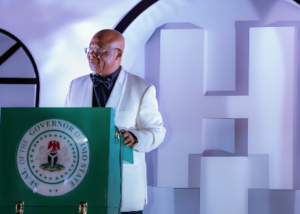
*Uzodimma*
Rochas Okorocha’s rise in 2011 appeared to signal a break from Imo’s succession curse. Charismatic, populist, and financially powerful, he commanded party structures and grassroots loyalty. By his second term, he seemed politically unassailable.
Yet Okorocha committed the most consequential succession error in the state’s history. By attempting to impose his son-in-law, Uche Nwosu, as successor, he crossed from political strategy into dynastic ambition. That decision detonated his massive support base in the State overnight.
Imo’s political elites revolted almost unanimously. Party affiliation became secondary to a shared determination to stop what was widely perceived as an attempt to privatise public office. The revolt was elite-driven, strategic, and ruthless.
The zoning factor compounded the crisis. Okorocha hailed from Orlu zone; so did Nwosu. For many Imo voters, the prospect of Orlu retaining power through familial succession was unacceptable. What might have been tolerated as ambition became framed as entitlement.
This time, elite resistance aligned with popular sentiment. The electorate queued behind alternatives not necessarily out of conviction, but out of rejection. Crucially, Emeka Ihedioha emerged governor because Okorocha fatally miscalculated—splitting his base, provoking elite rebellion, and underestimating voter resentment. Okorocha’s formidable structure collapsed under internal rebellion and voter backlash, sealing his failure to produce a successor.
Hope Uzodimma’s current position must be assessed against this turbulent history. At present, the structural indicators are in his favour. He enjoys firm federal backing, controls the APC machinery in the state, and commands the support—or at least the compliance—of most major political elites.
Unlike Udenwa, Uzodimma is aligned with the centre. Unlike Ohakim, he has survived electoral tests. Unlike Okorocha, he has not openly flirted with dynastic politics. On the surface, the succession equation appears favorable.
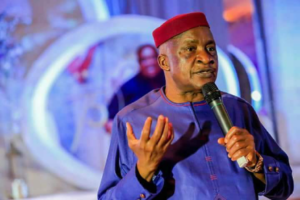
*Udenwa*
However, Imo’s history cautions against certainty. Elite loyalty in the state is conditional and transactional. It endures only where interests are balanced, ambitions managed, and inclusion sustained. A wrong choice of successor could still provoke elite conspiracy, even if it emerges from within the ruling party.
The opposition remains weak and fragmented, with limited capacity to mobilize mass resistance. Yet voter apathy, now more pronounced than during the Udenwa and Okorocha eras, introduces a new risk. Disengaged electorates are unpredictable and often disruptive.
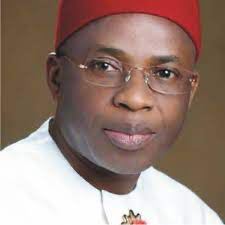
“Ohakim*
Ultimately, Uzodimma’s challenge is not opposition strength but elite psychology. Suppressed ambitions, if mishandled, can erupt. Succession in Imo has never been about coronation; it is about negotiation.
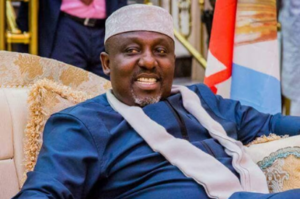
*Okorocha*
History is unforgiving to governors who confuse incumbency with ownership. Power in Imo is never transferred by decree. As 2027 approaches, the same forces that toppled past succession plans remain alive. Whether Uzodimma avoids their trap will depend not on power alone, but on restraint, balance, and political wisdom.
-
Business1 year ago
US court acquits Air Peace boss, slams Mayfield $4000 fine
-

 Trending1 year ago
Trending1 year agoNYA demands release of ‘abducted’ Imo chairman, preaches good governance
-

 Politics1 year ago
Politics1 year agoMexico’s new president causes concern just weeks before the US elections
-

 Politics1 year ago
Politics1 year agoPutin invites 20 world leaders
-

 Politics1 year ago
Politics1 year agoRussia bans imports of agro-products from Kazakhstan after refusal to join BRICS
-
Entertainment1 year ago
Bobrisky falls ill in police custody, rushed to hospital
-
Entertainment1 year ago
Bobrisky transferred from Immigration to FCID, spends night behind bars
-
Education1 year ago
GOVERNOR FUBARA APPOINTS COUNCIL MEMBERS FOR KEN SARO-WIWA POLYTECHNIC BORI







